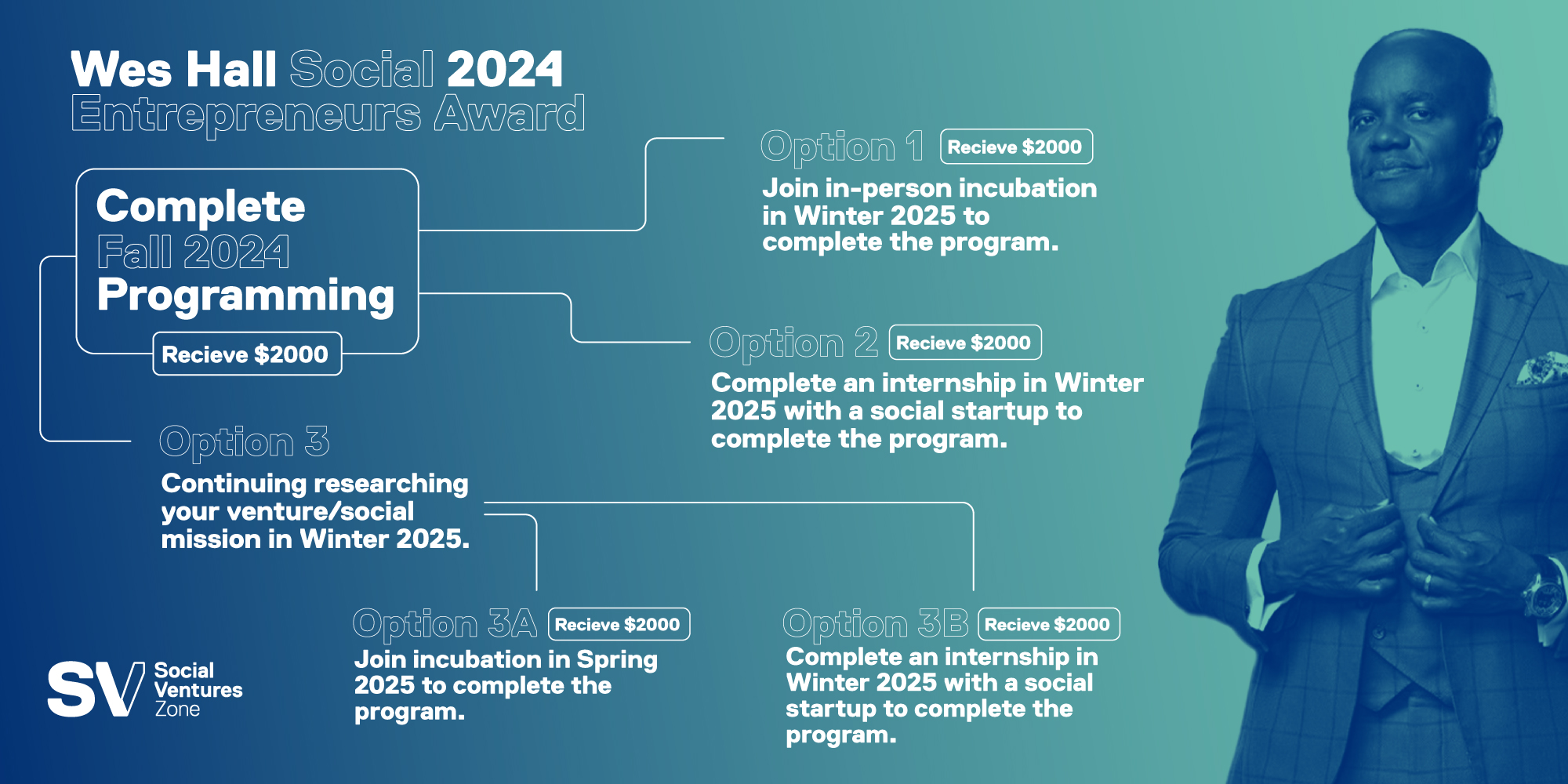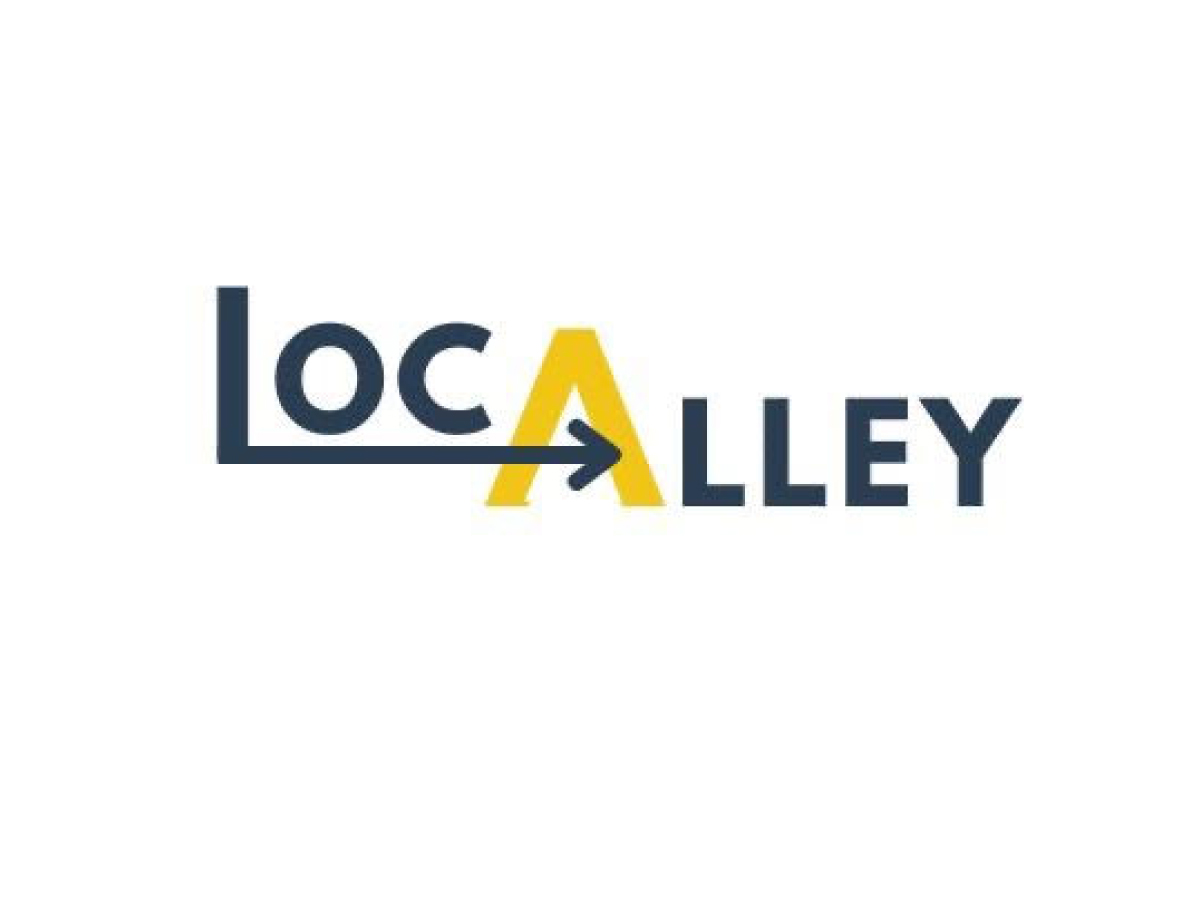Wes Hall Social Entrepreneurs Award

The Wes Hall Social Entrepreneurs Award annually supports five full-time undergraduate students of Caribbean descent at Toronto Metropolitan University who are passionate about creating positive change in the community through social entrepreneurship.
Racialized and other underrepresented groups often face distinct barriers that can prevent them from realizing their dream of starting a business. Founded by Jamaican-Canadian entrepreneur, philanthropist and social innovator Dr. Wes Hall, this award provides students from underrepresented groups with bespoke social venture programming, and a community of coaches, mentors, and supporters so they can explore the world of social entrepreneurship.
Award Details
Recipients will receive $4,000 and throughout the academic year, they will participate in a series of curated workshops about social entrepreneurship and building a social enterprise. After the Fall programming, recipients can follow one of three paths:
1) Continue ideating their idea for a social enterprise through the Winter semester and then complete incubation or an internship in the Spring semester.
2) Complete incubation in the Winter semester.
3) Complete an internship with a social venture in the Winter semester.
$2,000 will be awarded to each recipient at the end of January, and another $2,000 will be awarded after the completion of incubation or an internship.
Eligibility
- Applicants must be full-time undergraduate students
- Applicants must be of Caribbean descent
- Applicants must have a clear academic standing
- Applicants must have a 2.67 GPA or higher
- Applicants must demonstrate financial need
Selection Criteria
Eligible applicants are asked to submit a 250 word statement detailing how their Caribbean ancestry has shaped their journey and desire to make change through entrepreneurship, and how this opportunity will help them to achieve their goals.
Applications for 2024 closed on October 31st.

Hear From Past Award Recipients

Angelle Spencer
Public Health and Safety, Class of 2021
Angelle applied for the Wes Hall Award with a business idea she wanted to bring to life, but she needed some help figuring out how to reach people. She wants to start a program for Black Canadians to easily access the resources and information they need to advance their goals. "The Social Ventures Zone workshops were very valuable for me," she says. "Then working with a small business I was able to see how to put those things I learned from the SVZ into action.”
Her biggest takeaways: How to get a business up and running, marketing for small businesses
"The experience you gain from the Social Ventures Zone is invaluable. I don't think you can get that anywhere else."
For her internship, Angelle worked with LocAlley, a social venture that helps connect small businesses with community resources to assist them with the challenges brought on by the pandemic. She helped out with their marketing and social media efforts. "That was right along the lines of what I wanted to do for people," says Angelle. "I loved working with that team."

Cheo Bannis
Medical Physics, Class of 2021
With his academic background in the field of science, Cheo applied to the award to gain some entrepreneurial experience. His business idea involves building solar charging stations in Dominica to help reduce electricity costs for those living in poverty.
Meeting Wes Hall himself was also an impactful experience for Cheo. “Listening to his experiences, especially coming from a Caribbean background as well, it's always good to see people that look like you, and see how far they got along and how they got there.”
His biggest takeaways: networking opportunities, constructive business feedback
"It's a really good experience regardless of your background. It helps with personal development because you have to put yourself out there, and it gives you another dimension to the academic knowledge you’re getting in the classroom.”
Cheo's internship took place with Decomp, a startup in the SVZ that aligns with his goals to start a business involving alternative energy. Decomp is focused on developing a solution to plastic waste that involves plastic degrading microbes. Cheo helped them out with grant writing and comparative analysis. He is continuing to work with Decomp, and hopes to begin working in the lab soon.

Nathan Reid
Nutrition and Food, 3rd Year Student
After participating in the SVZ's Ideation program, Nathan applied for the Wes Hall Award with an idea that would help fight food insecurity in post-secondary students. His goal is to use digital media to empower students to improve their food literacy and gain confidence in cooking their own meals using fresh and healthy ingredients.
The mentorship and workshops helped him develop his idea and define the social issue he’s trying to address. “Being able to put together a pitch with help from the SVZ and then being able to recieve feedback gave me confidence and more experience in the realm of business."
His biggest takeaways: seeing how a startup is run firsthand, collaborating with the Hope Pet Food team
“You can make your idea a reality with the help of the award and the skills that you learn from being in the program.”
Nathan worked with HOPE Pet Food, an SVZ startup developing sustainable, meat-free, nutritious food for pets. Nathan's project involved developing a human friendly treat that both pets and their owners can enjoy. He says that being able to speak with the founders about how they got started and the challenges they face gave him valuable insight for his own business. "It's a really cool experience to be able to work with people in the field who are also trying to make an impact," he says. "Being able to get that experience firsthand was very beneficial."

Omega Luxor
Psychology, 4th Year Student
When she applied for the Wes Hall Award, Omega wanted to be involved in something that would better her community. She was also interested in the phenomenon of lash extensions. The mentorship she received through the program helped bring these two passions together and clarify her vision. Now she’s developing a scholarship and training program for women of colour to help them launch their own side hustles. The financial portion of the award helped Omega get started on her business idea. She’s now a certified lash technician and is continuing to network and build her clientele.
Her biggest takeaways: learning to take chances, being open to opportunities
“If you have a goal or vision, no matter what it is, you can turn it into something that helps a lot of different people.”
Omega worked as a Special Initiatives Intern for Accelerate Her Future, a career accelerator for women of colour in business or technology. She says the internship also helped her in areas outside of business, including her academics. “I was surrounded by other women like myself and they were able to give me advice. Working on their projects inspired me even more. I still have contact with them,” she says. “It was a great way for me to network and build that community.”

Shadai Scoburgh
Journalism, 3rd Year Student
Shadai wants to develop a hotline for students with easily accessible information and resources. “When I got into the program I had a rough idea of what I wanted my project to look like. As I got introduced to people within the program my small idea developed into something so much bigger,” she says. She mentions how feedback from the other award recipients helped push her idea even further. “It was really encouraging because we all got to hear each other's ideas, bounce ideas off of each other, and hear what our community has to offer.”
Her biggest takeaways: developing her business idea, connecting with other startups
“The workshops are super beneficial because they helped me take such a small idea and really develop it into something bigger and make it more inclusive.”
Shadai connected with a podcast project housed in the Transmedia Zone called Radical Gossip. Their in-depth conversations focus on the intersections of social issues. As they’re in the process of rebranding, she’s working with them to conduct research to figure out what their community needs, as well as developing content ideas.




